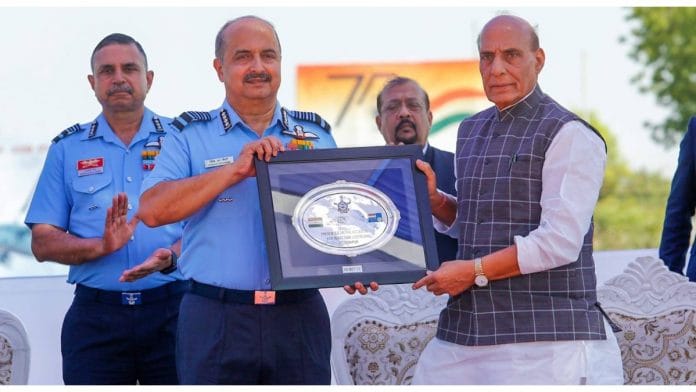New Delhi: With the theaterisation process of the military gaining steam with India getting a new Chief of Defence Staff (CDS) after nine months, the Indian Air Force (IAF) said Tuesday that the need of the hour was an organisational structure best suited for the country’s conditions and geopolitical imperatives.
Noting that air power has the unique capability of undertaking independent strategic operations as well as operations coordinated with sister services and other arms of the national security apparatus, IAF chief Air Chief Marshal V. R. Chaudhari said joint planning was necessary.
“We understand the imperativeness of joint planning and execution in future wars and are keen on integrating the efforts of the three services,” he said, addressing his annual press conference ahead of the Air Force Day on 8 October.
He added the IAF believes the model of integration that India adopts must be future-ready, must reduce levels of decision-making, and capitalise on the strength of all three services.
“We need an organisational structure that is best suited for Indian conditions and our geopolitical imperatives,” he said.
ACM Chaudhari pointed out that the IAF has recently updated and revised its doctrine to keep it relevant.
“The next step would be to use our doctrines and well-trained manpower to evolve employment philosophies and Concepts of Operations,” he said.
The IAF chief underlined this would require joint planning and joint execution of plans.
“No single service can win wars on its own and this holds good even for the future,” he said.
As reported by ThePrint, the IAF had issues with the proposals for theaterisation put forward by then CDS General Bipin Rawat.
The original theaterisation process envisions an Air Defence Command under the IAF and aviation assets being split into other theatres.
The IAF is of the view that there should only be one command — the India Command — with all the three services working in synergy.
ACM Chaudhari, however, said it was wrong to think the force was opposed to theaterisation.
“We are not opposing any process of integration for having theatre commands. We have certain reservations about the structures. Whatever structure, it should be future ready” and not just for traditional wars, he said.
He said the decision-making chain should be reduced in the new structures rather than adding more layers.
He also pointed out the IAF does not have many assets to be split into theatre commands even though they have the flexibility of moving from one region to another swiftly.
“Each service has its own doctrines and doctrinal aspects of the IAF should not be affected,” he said.
Asked if the IAF would be able to lead a Pakistan-centric theatre command, he said it would.
ACM Chaudhari said recent events on the global landscape (the Russia-Ukraine War) have clearly indicated a strong military is imperative to ward off external threats through deterrence and if deterrence fails, to neutralise those threats.
Therefore, the armed forces in general and the IAF in particular, would continue to remain a lynchpin in the national security matrix both as a coercive deterrent as well as a war-winning instrument, he said.






